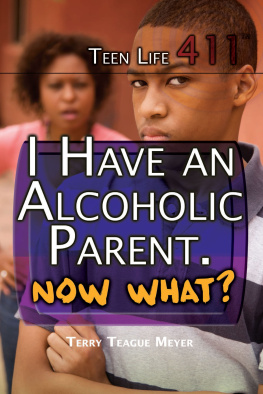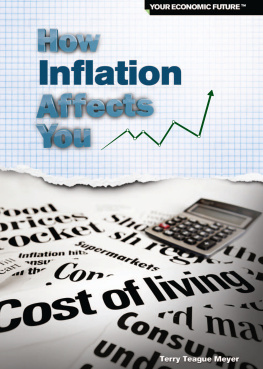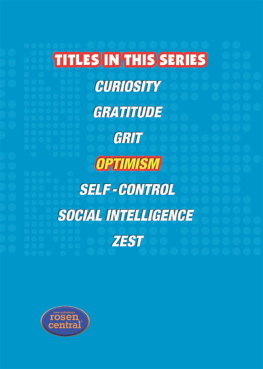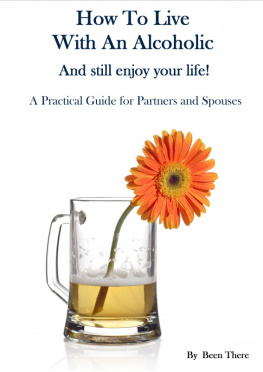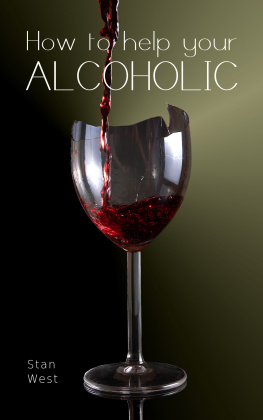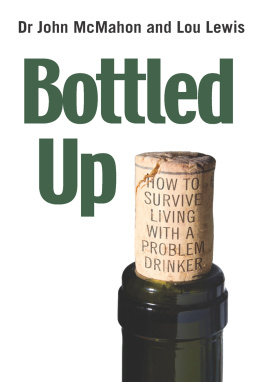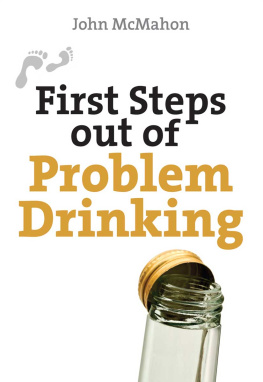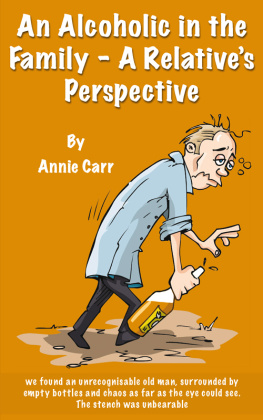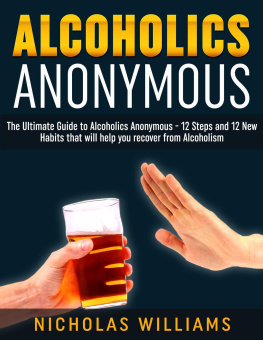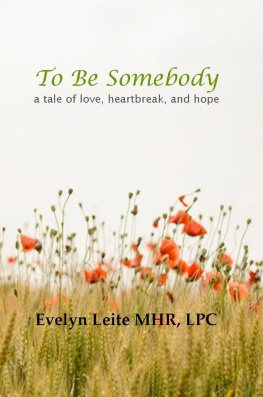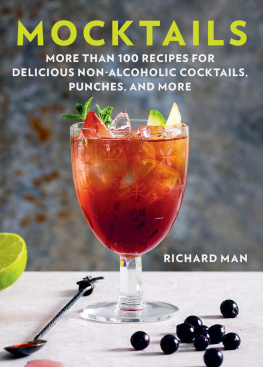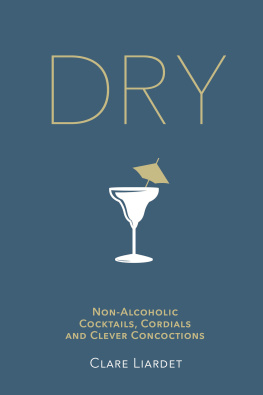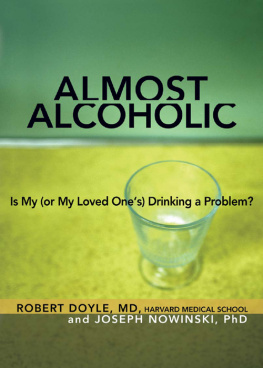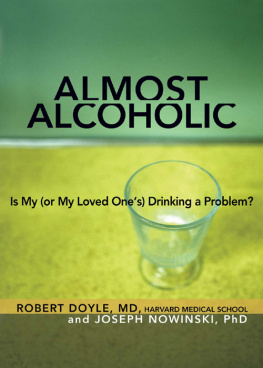Published in 2015 by The Rosen Publishing Group, Inc.
29 East 21st Street, New York, NY 10010
Copyright 2015 by The Rosen Publishing Group, Inc.
First Edition
All rights reserved. No part of this book may be reproduced in any form without permission in writing from the publisher, except by a reviewer.
Library of Congress Cataloging-in-Publication Data
Meyer, Terry Teague.
I have an alcoholic parent. Now what?/Terry Teague Meyer.First edition.
pages cm.(Teen life 411)
Includes bibliographical references and index.
ISBN 978-1-4777-7982-8 (library bound)
1. AlcoholicsFamily relationshipsJuvenile literature.
2. Children of alcoholicsJuvenile literature. 3. Alcoholism Juvenile literature. I. Title.
HV5132.M493 2015 362.2923dc23
2014009014
Contents
INTRODUCTION
C ourtney was in her teens before she figured out the connection between alcohol and the constant storm raging at her house. When she visited with friends, she often found herself envious of their relationships with their parents. At home, she and her brothers and sisters had to be on their best behavior all the time. They never knew what mood their parents would be inhappy or angry. Those moods were extreme and could change in an instant. Dinners and barbeques at friends houses didnt start with drinks and end with people yelling at one another. Finally, Courtney realized that her parents were alcoholics. They couldnt control their drinking, or what happened once they started.
Courtney is not alone. The 2012 National Survey on Drug Use and Health found that 6.5 percent of the American population reported heavy drinking in the past year. Thats seventeen million people. The results were the same in 2011. Worse, people between the ages of twenty-six and fifty had even higher rates of heavy alcohol use. Between 7.1 and 9.9 percent of this age group drink heavily. This survey is based on reported usage, so it is very likely that many heavy drinkers underestimated or underreported how much they actually drank.
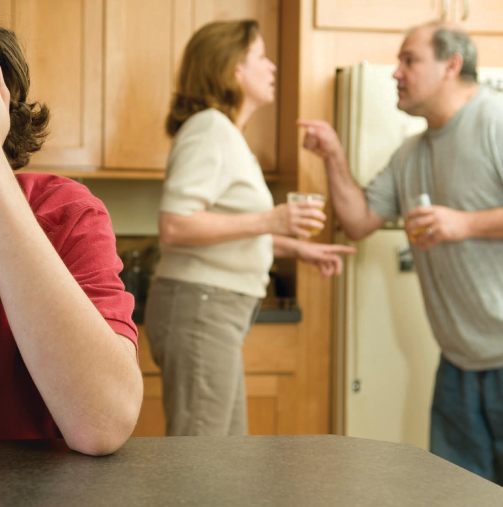
Children of problem drinkers never know when the next family fight will break out. Their parents' behavior is hard to predict.
Many of these problem drinkers do not see themselves as alcoholics. Despite this, each one is well on the way to having serious health, work, or relationship problems because of drinking. Each of these heavy drinkers also has friends or a family or both who will be negatively affected by the excessive alcohol use. If you are awareor beginning to suspectthat your parent (or parents) is an alcoholic, you probably feel alone and uncertain about what to do. This resource aims to provide information to help cope with this kind of situation.
First, its important to know how experts define the many forms of alcohol abuse. Then its variety of causes can be identified. Doing both can help someone put a name to the problem at home. Being aware of available resources to help alcoholics and their families will help support those dealing with this situation. Learning about the different treatment choices available to aid recovery from alcohol addiction can offer hope.
All individuals and families are unique. Problem drinkers are also unique. Each has his or her own reasons, patterns, and behaviors associated with alcohol abuse. For this reason, an alcoholics path to recovery must be an individual one. Fortunately, there are many treatment choices available. Family members impacted by a parents addiction will also follow an individual path. Each one is affected according to his or her personality and position in the family. Whether or not the parent seeks treatment, the loved ones of an alcoholic must each find his or her own way to break free from the unhealthy environment created by addiction. That journey begins with understanding what lies ahead.
Chapter1
HOW DO YOU RECOGNIZE AN ALCOHOLIC?
E xperts recognize that all alcoholics are not alike. Even someone who does not fit the definition of alcoholic can still have a drinking problem. In turn, drinking problems threaten drinkers health, work life, and relationships. Consequently, scientists and medical experts in alcohol use and abuse have a number of different ways to identify those at risk of alcohol abuse. One measure of how much is too much starts with understanding what a drink is.
Whats in That Drink?
Each year, the Substance Abuse and Mental Health Services Administration (SAMHSA) conducts a National Survey on Drug Use and Health. It tracks alcohol use and abuse around the country by age, gender, and race or ethnic group, among other categories. This study defines a drink as a can or bottle of beer, a glass of wine or a wine cooler, a shot of liquor, or a mixed drink with liquor in it. The Centers for Disease Control and Prevention (CDC) gives a more specific definition of a drink. It is anything that contains 14 grams or 1.2 ounces of pure alcohol. So what does that amount look like?
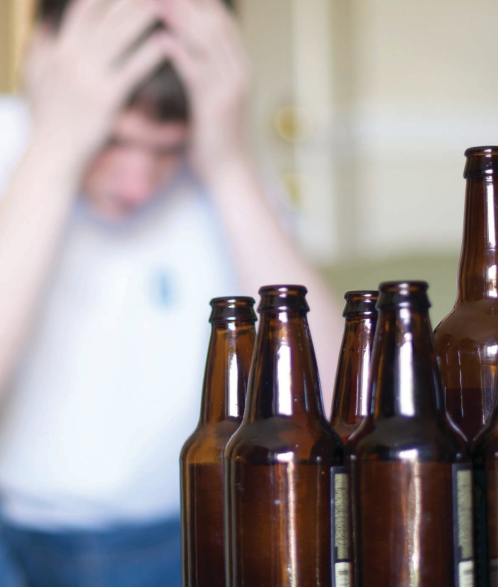
Many people don't know what it means to drink in moderation. It is important to understand how much alcohol is in any beverage you consume.
- 12 ounces (1 % cups) of beer or wine cooler.
- 8 ounces (1 cup) of malt liquor. Malt liquor looks like beer, but has a higher alcohol content.
- 5 ounces (a little more than 1/4 cup) of wine.
- 1.5 ounces (3 tablespoons) of distilled liquor like whiskey, gin, rum, or vodka. This kind of alcohol is often called hard liquor.
Its important to know what a drink is. The problem is that many problem drinkers might be unaware of what makes a drink. Some drinkers ignore the problem saying they drink only beer or only wine. However, they might consume as much alcohol during an evening as someone drinking hard liquor. Wine, distilled liquor, and mixed drinks can be particularly difficult for problem drinkers. They can easily fool themselves into thinking that a cocktail or wine glass filled to the brim is one drink, when it might actually contain up to four servings of alcohol.
Experts at the CDC and elsewhere define moderate drinking as one drink a day for a woman and two drinks a day for a man. This difference has to do with size. A mans larger size allows him to metabolize, or process, more alcohol than a woman, as women on the average tend to be smaller. Moderate drinking means one or two drinks a day; it does not mean seven drinks on Saturday night after not drinking all week. According to the CDC, binge drinking is defined as four or more drinks during a single occasion for women and five or more drinks for men. More than one or two drinks per day is considered heavy drinking. Binge drinking is another type of alcohol abuse.
No Alcohol Allowed
For some people, alcohol is particularly dangerous and no amount can be considered safe. A pregnant woman could harm her unborn child by drinking. The National Council on Alcoholism and Drug Dependence (NCADD) reminds pregnant women that when they drink, the fetus is directly affected by the alcohol. Unborn children can suffer a range of disabilities, from mild to severe. If a woman drinks very early in a pregnancy, even before she knows she is pregnant, there is even greater risk. For this reason, women planning to become pregnant or those having unprotected sex should not drink alcohol.

